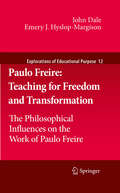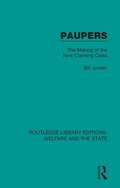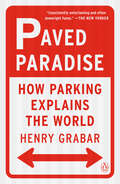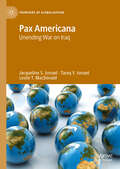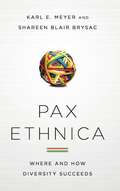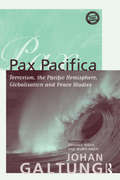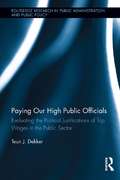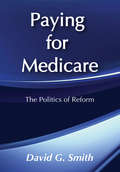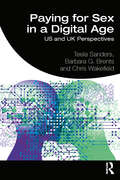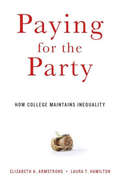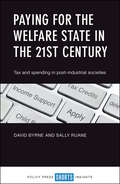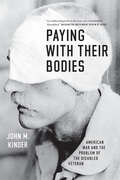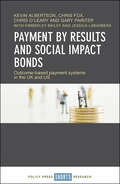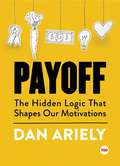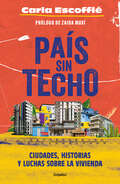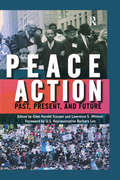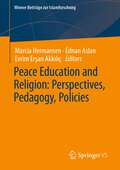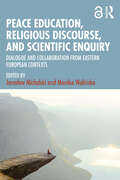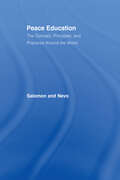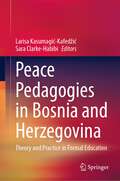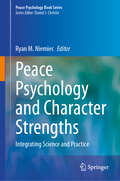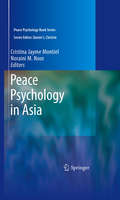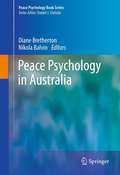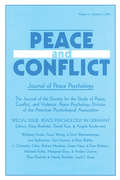- Table View
- List View
Paulo Freire: Teaching for Freedom and Transformation
by John Dale Emery J. Hyslop-MargisonThe primary mission of this text is clarifying many of the misconceptions about Paulo Freire's theories, concepts and his implications for education. It revisits his ideas and explains more fully the philosophical influences that shaped concepts such as problem posing, conscientization and praxis. The fundamental thesis, then, is that the present absence of in-depth philosophical analysis leaves an unacceptable void in the literature addressing Freire's work, while also promoting frequent misconceptions and superficial understandings about his relationship to contemporary education. Indeed, the philosophical assumptions contributing to Freire's critical pedagogy require identification, unravelling and ultimately evaluation on the basis of their epistemic and moral tenability. Most existing applications of Freire's pedagogy are unfortunately superficial because they simply sloganize terms such as banking education, conscientization, praxis, and humanization. A slogan in education popularizes a concept or idea in a positive way, but offers very little in terms of critical reflection or analysis. In order to understand these terms and their origin and apply them as Freire intended, a far richer and more in depth examination of Freire is desperately needed. This text will provide precisely that type of examination.
Paupers: The Making of the New Claiming Class (Routledge Library Editions: Welfare and the State #11)
by Bill JordanOriginally published in 1973, Paupers looks at poverty through the lens of class and the Welfare State. The book examines those living in poverty, and the direct effects poverty has. The book follows the basis that the economic factors which gave rise to poverty, have little to do with the Welfare State, and that fragmentary changes, can do little to change them. The book’s core argument examines the political and social significance of poverty, and look at the underlying causes and effects of the drift towards a more unequal and unjust society. The book also analyses the factors which bring economically disadvantaged people together, and what happens when they join for collective action.
Paved Paradise: How Parking Explains the World
by Henry Grabar&“Consistently entertaining and often downright funny.&” —The New Yorker&“Wry and revelatory.&” —The New York Times"A romp, packed with tales of anger, violence, theft, lust, greed, political chicanery and transportation policy gone wrong... highly entertaining." —The Los Angeles TimesAn entertaining, enlightening, and utterly original investigation into one of the most quietly influential forces in modern American life—the humble parking spotParking, quite literally, has a death grip on America: each year a handful of Americans are tragically killed by their fellow citizens over parking spots. But even when we don&’t resort to violence, we routinely do ridiculous things for parking, contorting our professional, social, and financial lives to get a spot. Indeed, in the century since the advent of the car, we have deformed—and in some cases demolished—our homes and our cities in a Sisyphean quest for cheap and convenient car storage. As a result, much of the nation&’s most valuable real estate is now devoted exclusively to empty and idle vehicles, even as so many Americans struggle to find affordable housing. Parking determines the design of new buildings and the fate of old ones, patterns of traffic and the viability of transit, neighborhood politics and municipal finance, the quality of public space, and even the course of floodwaters. Can this really be the best use of our finite resources and space? Why have we done this to the places we love? Is parking really more important than anything else?These are the questions Slate staff writer Henry Grabar sets out to answer, telling a mesmerizing story about the strange and wonderful superorganism that is the modern American city. In a beguiling and often absurdly hilarious mix of history, politics, and reportage, Grabar brilliantly surveys the pain points of the nation&’s parking crisis, from Los Angeles to Disney World to New York, stopping at every major American city in between. He reveals how the pathological compulsion for car storage has exacerbated some of our most acute problems—from housing affordability to the accelerating global climate disaster—ultimately, lighting the way for us to free our cities from parking&’s cruel yoke.
Pax Americana: Unending War on Iraq (Frontiers of Globalization)
by Jacqueline S. Ismael Tareq Y. Ismael Leslie T. MacDonaldThis book surveys the testimony of international organizations of the impact of American foreign policy on Iraq. Each reveals a fragment of Iraq’s mosaic of misery and desolation, but lacks the context to permit our understanding why this has happened. A parallel lack of context characterizes most of the political commentary, overlooking the recurring pattern of victimization of Iraqis, regardless of which political party controls the White House. This book takes a broader perspective, to reveal the enduring pattern linking specific events.
Pax Ethnica: Where and How Diversity Succeeds
by Karl E. Meyer Shareen Blair BrysacIn a world replete with stories of sectarian violence, we are often left wondering: Are there places where people of different ethnicities, especially with significant Muslim minorities, live in peace? If so, why havenOCOt we heard more about them, and what explains their success? To answer these questions, Karl Meyer and Shareen Brysac undertook a two-year exploration of oases of civility, places notable for minimal violence, rising life-expectancy, high literacy, and pragmatic compromises on cultural rights. They explored the Indian state of Kerala, the Russian republic of Tatarstan, the city of Marseille in France, the city of Flensburg, Germany, and the borough of Queens, New York. Through scores of interviews, they document ways and means that have proven successful in defusing ethnic tensions. This pathbreaking book elegantly blends political history, sociology, anthropology, and journalism, to provide big ideas for peace.
Pax Pacifica: Terrorism, the Pacific Hemisphere, Globalization and Peace Studies (Constructive Peace Studies)
by Daisaku Ikeda Johan GaltungJohan Galtung is the world's foremost thinker in peace studies. This remarkable book is his response to the events of 9/11. It is a philosophical collection of essays on terror, war, and peace which engages with the key issues and obstacles we face in attempting to create peace around the world. Focusing in particular on the Pacific region, he presents a grounded assessment of the history of the regional power dynamics and present prospects for peace.
Paying Our High Public Officials: Evaluating the Political Justifications of Top Wages in the Public Sector (Routledge Research in Public Administration and Public Policy)
by Teun J. DekkerIn almost every liberal democratic society, an issue that is a topic of constant and passionate public discussion is how much that country’s ministers, legislators, senior civil servants, and senior judges should be paid. Nor is this surprising; the issue has considerable voyeuristic appeal, particular democratic significance, and important ramifications for the functioning of the public sector as a whole. However, like most political debates, these discussions tend to be messy, fragmented, and full of unverified assertions and spurious appeals to populist sentiment. It is hardly surprising that those discussions rarely succeed in putting the matter to rest. Paying Our High Public Officials examines the political discourse concerning this question in 17 liberal democracies (Canada, the United States, Mexico, Norway, Finland, the Netherlands, the United Kingdom, Ireland, Germany, Austria, Switzerland, France, Poland, Italy, Hong Kong, Singapore, and New Zealand). Based on many hundreds of parliamentary debates, newspaper articles, speeches, as well as reports by think tanks and high commissions of state, the book identifies seven central arguments that occur in all these societies, translates them into the language of analytical philosophy, and then rigorously evaluates them. This approach contributes to a better understanding of this controversy and may result in better-justified and more legitimate conclusions concerning which policy to adopt.
Paying Out-of-Pocket for Drugs, Diagnostics and Medical Services: A Study of Households in Three Indian States
by Moneer AlamIn India there is a high incidence of morbidity and malnutrition coupled with low standards of public health and expensive medical care. Despite several policy initiatives and many attempts to promote a healthy society, health remains an issue of concern. Policy-makers recognise that the country suffers unacceptably high levels of disease and premature death. A 2005 report from the National Commission on Macroeconomics and Health (NCMH) claims that private out-of-pocket (OOP) health expenditure often has a catastrophic effect on the consumption of basic goods and services for low-income households, forcing many below the poverty line and often blocking private intergenerational flows, severely affecting family members including the co-residing elderly, especially women. As poverty, malnutrition and enormous disparities are widespread, particularly in rural areas and urban slums, reliance on private health providers is fraught with serious economic consequences. Disease prevalence among these groups is particularly high. The market plays an increasingly important role in delivering health and diagnostic services. Infrastructural bottlenecks faced by central, state and local government health services force public health service users to access private medical care and incur very high out-of-pocket (OOP) expenses. All these issues are in direct contradiction to India's National Population Policy (2000) and National Health Policy (2002). This book highlights some of these neglected issues, and focuses largely on private expenditure on drugs and medicines for the treatment of ailments both with and without hospitalisation. It examines private OOP health expenditures in rural and urban households after breaking them down into the various healthcare service components including drugs and medicines (which constitute about 75 to 80 percent of OOP health expenditure), and assesses the extent of capital sample households borrow to finance medical expenditure and the effect on their basic food and non-food consumption requirements.
Paying for Medicare: The Politics of Reform (Social Institutions And Social Change Ser.)
by David G. Smith** Paying for Medicare received the American Risk and Insurance Association's Elizur Wright Award for itsoutstanding contribution to risk management and insurance literature.The Prospective Payment System and the Medicare Fee Schedule, two of the most effectively sustained and successful efforts at policy innovation in history continue to shape decisions about Medicare and cost containment efforts.Smith shows how particular policy alternatives were developed; why chosen or rejected; and how provider interests and American political institutions have shaped their design and implementation.
Paying for Sex in a Digital Age: US and UK Perspectives
by Teela Sanders Barbara G. Brents Chris WakefieldProviding one of the first comprehensive, cross-cultural examinations of the dynamic market for sexual services, this book presents an evidence-based look at the multiple factors related to purchasing patterns and demand among clients who have used the internet. The data is drawn from two large surveys of sex workers’ clients in the US and UK. The book presents descriptive baseline data on client engagement with online platforms, demographics and patterns of frequency in different markets, information on smaller niche markets and client reactions to exploitation, safety and changes in the law. The book makes clear that a variety of situational as well as individual factors affect the willingness and ability to purchase sexual services. The view that emerges shatters the stereotypes and generalistions on which much policy is based and demonstrates the complexities surrounding who pays for sex and the contours of sexual consumption in consumer culture.
Paying for the Party
by Elizabeth A. Armstrong Laura T. HamiltonTwo young women, dormitory mates, embark on their education at a big state university. Five years later, one is earning a good salary at a prestigious accounting firm. With no loans to repay, she lives in a fashionable apartment with her fiancé. The other woman, saddled with burdensome debt and a low GPA, is still struggling to finish her degree in tourism. In an era of skyrocketing tuition and mounting concern over whether college is “worth it,” Paying for the Party is an indispensable contribution to the dialogue assessing the state of American higher education. A powerful exposé of unmet obligations and misplaced priorities, it explains in vivid detail why so many leave college with so little to show for it. Drawing on findings from a five-year interview study, Elizabeth Armstrong and Laura Hamilton bring us to the campus of “MU,” a flagship Midwestern public university, where we follow a group of women drawn into a culture of status seeking and sororities. Mapping different pathways available to MU students, the authors demonstrate that the most well-resourced and seductive route is a “party pathway” anchored in the Greek system and facilitated by the administration. This pathway exerts influence over the academic and social experiences of all students, and while it benefits the affluent and well-connected, Armstrong and Hamilton make clear how it seriously disadvantages the majority. Eye-opening and provocative, Paying for the Party reveals how outcomes can differ so dramatically for those whom universities enroll.
Paying for the Welfare State in the 21st Century: Tax and Spending in Post-Industrial Societies
by David Byrne Sally RuaneWhat does the future hold for the welfare state in the post-industrial 21st century? Political and economic forces are threatening the taxation regimes of highly globalised, capitalist societies, prompting an urgent debate around the function of the welfare state and how we pay for it. In a challenge to current policy and thinking, David Byrne and Sally Ruane deploy the concepts and analytical tools of Marxist political economy to better understand these developments, and the possibilities they present for social change. Using the SNP in Scotland as an illustrative case study, current debates are related to a critical understanding of the relationship between taxation and spending, issues that are fundamental to early 21st century politics and the future of the welfare state.
Paying with Their Bodies: American War and the Problem of the Disabled Veteran
by John M. KinderChristian Bagge, an Iraq War veteran, lost both his legs in a roadside bomb attack on his Humvee in 2006. Months after the accident, outfitted with sleek new prosthetic legs, he jogged alongside President Bush for a photo op at the White House. The photograph served many functions, one of them being to revive faith in an American martial ideal--that war could be fought without permanent casualties, and that innovative technology could easily repair war's damage. When Bagge was awarded his Purple Heart, however, military officials asked him to wear pants to the ceremony, saying that photos of the event should be "soft on the eyes. " Defiant, Bagge wore shorts. America has grappled with the questions posed by injured veterans since its founding, and with particular force since the early twentieth century: What are the nation's obligations to those who fight in its name? And when does war's legacy of disability outweigh the nation's interests at home and abroad? In Paying with Their Bodies, John M. Kinder traces the complicated, intertwined histories of war and disability in modern America. Focusing in particular on the decades surrounding World War I, he argues that disabled veterans have long been at the center of two competing visions of American war: one that highlights the relative safety of US military intervention overseas; the other indelibly associating American war with injury, mutilation, and suffering. Kinder brings disabled veterans to the center of the American war story and shows that when we do so, the history of American war over the last century begins to look very different. War can no longer be seen as a discrete experience, easily left behind; rather, its human legacies are felt for decades. The first book to examine the history of American warfare through the lens of its troubled legacy of injury and disability, Paying with Their Bodies will force us to think anew about war and its painful costs.
Payment by Results and Social Impact Bonds: Outcome-Based Payment Systems in the UK and US
by Chris Fox Kevin AlbertsonAs public services budgets are cut, the ‘Payment by Results’ (or Pay for Success) model has become a popular choice in public sector commissioning. Social Impact Bonds are a variant of Payment by Results also promoted by proponents of social (or impact) investing. But how effective are these approaches? This short book asks whether the Payment by Results model is an efficient way to unlock new capital investment, help new providers to enter the ‘market’ and foster innovation, or whether the extension of ‘neoliberal’ thinking, complexity and the effects of managerialism undermine the effective delivery of social outcomes. Synthesising lessons from the UK and US for the first time, the book draws on published work in both countries together with insights from the authors’ own research and consultancy experience to offer a balanced and bipartisan overview of a field where the evidence has been weak and there are strong ideological agendas in play.
Payoff: The Hidden Logic That Shapes Our Motivations (TED Books)
by Dan ArielyBestselling author Dan Ariely reveals fascinating new insights into motivation—showing that the subject is far more complex than we ever imagined.Every day we work hard to motivate ourselves, the people we live with, the people who work for and do business with us. In this way, much of what we do can be defined as being “motivators.” From the boardroom to the living room, our role as motivators is complex, and the more we try to motivate partners and children, friends and coworkers, the clearer it becomes that the story of motivation is far more intricate and fascinating than we’ve assumed. Payoff investigates the true nature of motivation, our partial blindness to the way it works, and how we can bridge this gap. With studies that range from Intel to a kindergarten classroom, Ariely digs deep to find the root of motivation—how it works and how we can use this knowledge to approach important choices in our own lives. Along the way, he explores intriguing questions such as: Can giving employees bonuses harm productivity? Why is trust so crucial for successful motivation? What are our misconceptions about how to value our work? How does your sense of your mortality impact your motivation?
País sin techo: Ciudades, historias y luchas sobre la vivienda
by Carla Escoffie«LA NECESARIA TRANSFORMACIÓN DE LO APARENTEMENTE INDIVIDUAL EN COLECTIVO Y POLÍTICO ES LA BASE DE ESTE LIBRO, LA IMPORTANCIA DE EXPLICAR Y DEMOSTRAR LOS CONTINUOS INCUMPLIMIENTOS DE LEYES Y NORMAS QUE DEFIENDEN EL DERECHO A LA VIVIENDA.» -zaida muxí La crisis de vivienda existe y no podemos seguir ignorándola. Nuestras ciudades son cada vez más inhabitables: cada vez más caras, más distantes, más precarizadas y con menos servicios. Miles de personas están preocupadas por su imposibilidad de adquirir unavivienda en propiedad o, incluso, en arrendamiento. Sin embargo, esta problemática sigue siendo percibida como una preocupación individualizada y no como el problema estructural que realmente es. A partir de entrevistas, investigación y casos judiciales, Carla Escoffié —experta en el derecho a la vivienda y el derecho a la no discriminación— traza una ruta por cinco ciudades: Mérida, San Francisco de Campeche, Ciudad de México, San Luis Potosí y Monterrey, para entender lo que hoy implica hablar del derecho a la vivienda, y algunas de las caras de las violaciones de dicho derecho en México. En ese recorrido delinea problemáticas como la especulación, los desalojos forzosos, las burbujas inmobiliarias, los megaproyectos, la discriminación en el acceso a la vivienda, la falta de derechos inquilinarios, losasentamientos precarios o las luchas territoriales, y nos hace entender cuáles son los actores y las dinámicas en torno a ellas. País sin techo confronta una idea básica tanto en la ética como en la teoría política: las ciudades son para ser habitadas. La vivienda es territorio y, como tal, puede ser despojada y acumulada. Pero también, nos dice la autora, puede ser defendida, compartida y reivindicada.
Peace Action: Past, Present, and Future
by Glen Harold Stassen Lawrence S Wittner"Peace Action: Past, Present, and Future" is a collection of short, lively essays written by prominent leaders and supporters of Peace Action and its two important predecessors the National Committee for a Sane Nuclear Policy and the Nuclear Weapons Freeze Campaign. Just in time for its 50th anniversary, Peace Action brings together reflections on the largest and most influential peace organization in history. At the same time, this book provides a unique resource for understanding popular protest against nuclear weapons and war in the modern era. It illuminates the local, national, and international role of Peace Action today and outlines Peace Action s strategies for the future, including ongoing protest against the war in Iraq and a negotiated resolution of nuclear issues in Iran and North Korea.Read Katrina vanden Heuvel's blog on "Peace Action" at http: //www.thenation.com"
Peace Education and Religion: Perspectives, Pedagogy, Policies (Wiener Beiträge zur Islamforschung)
by Ednan Aslan Marcia Hermansen Evrim Erşan AkkılıçWhether formally incorporated into curriculum and teacher training or informally integrated in contexts such as state or NGO initiatives dealing with resolving social, ethnic, and religious conflicts, peace education is increasingly recognized as a critical component in addressing violence in contemporary plural societies. Peace education can constructively undertake a reframing of historical narratives while inspiring practical community activities. An important, but insufficiently studied and theorized aspect of peace education is the role of religion. The challenge to peace education in today’s globalized, diverse, mobile, and religiously pluralistic world is to be able to take both complex global and distinctive local situations into account. The contributions to this integrative collection of essays provide exactly these local and global perspectives on the state of peace education and its relationship to religion across pedagogy and curriculum, state policies, and activism within societies on the front lines of resolving internal conflicts, whether historical or recent, that often reflect aspects of religious identities.
Peace Education, Religious Discourse, and Scientific Enquiry: Dialogue and Collaboration from Eastern European Contexts
by Jarosław Michalski Monika WolińskaEmpowering educators and policymakers to effect positive change in their communities, this book critically examines how sustained dialogue and cooperation between scientific inquiry and religious discourse can contribute to the fostering of successful peace education initiatives.Providing an overview of the historical and cultural context of peace education in Eastern Europe, the chapters look initially at the theoretical foundations, emphasising the need for empathy, internal peace, and traditional values. Featuring contributions from the United States, Germany, Italy, Slovakia, Turkey, and Poland, subsequent sections outline ethical, moral, and religious dimensions to inform effective peace education strategies, along with a discussion on how they can be harmonised with secular approaches to provide a holistic framework for peace education. Case studies and practical applications follow, ranging from Maria Montessori’s educational approach to the role of social media and sustainability in peace education, providing readers with a comprehensive understanding of how different perspectives can inform effective peace education strategies.With implications and take aways for educators and researchers looking to foster a culture of peace and non-violence, this book will be of interest to scholars, policymakers, postgraduate students, and curriculum designers in the fields of peace education, values education, conflict resolution, and social cohesion more broadly. Those working in peacebuilding organisations and NGOs more widely may also benefit from the chapters.
Peace Education: The Concept, Principles, and Practices Around the World
by Gavriel Salomon Baruch NevoPeace Education: * presents views on the nature of peace education, its history, and relationships to neighboring fields; * examines relevant psychological and pedagogical principles, such as the contact experience, conciliation through personal story telling, reckoning with traumatic memories, body-work, and the socio-emotional aspects of reconciliation; and * introduces an array of international examples from countries, such as Croatia, Northern Ireland, Israel, South Africa, Rwanda, and the United States in order to generalize lessons learned. A "must have" for all those thinking, planning, conducting, and studying peace education programs, it is intended for scholars, students, and researchers interested in peace and conflict resolution in higher education and volunteer and public organizations. Its cross disciplinary approach will appeal to those in social and political psychology, communication, education, religion, political science, sociology, and philosophy.
Peace Pedagogies in Bosnia and Herzegovina: Theory and Practice in Formal Education
by Larisa Kasumagić-Kafedžić Sara Clarke-HabibiThis collection presents interdisciplinary perspectives on educating for peace in Bosnia and Herzegovina. It explores a range of theories, contexts, pedagogies and practices within formal education settings and draws attention to the multiple roles that teachers play in fostering socially transformative learning. The volume offers readers a critical exploration of peace pedagogy as an imagined ideal and fluid space between post-war educational politics, institutional and curricular constraints, and the lived experiences and identities of teachers and students in socially and historically situated communities. The book highlights local voices, initiatives and practices by illustrating good examples of how classrooms are being connected to communities, teacher education programs and teachers’ continued professional development. It demonstrates why and how the grammars of peace in Bosnia and Herzegovina are still in a state of flux and negotiation, and what the implications are for classroom practice and pedagogy. Recommendations are offered for policymakers, curriculum developers, teacher educators and teachers on how peace pedagogies can be promoted at all levels of the education system and through pre-service and in-service teacher education, taking into account the structural uniqueness of the country.
Peace Psychology and Character Strengths: Integrating Science and Practice (Peace Psychology Book Series)
by Ryan M. NiemiecIn this volume the sciences of peace psychology and character strengths integrate in a substantive way to examine how the positive parts of our personality can contribute and impact each “level” of peace - inner, relational, group, community, international, and ecological peace. Readers will discover a wide range of insights, models, and scholarship; new studies conducted for this volume; and practical strategies to bring greater peace to oneself, one’s relationships, and the world.
Peace Psychology in Asia
by Noraini M. Noor Cristina Jayme MontielIn recent years, peace psychology has grown from a utopian idea to a means of transforming societies worldwide. Yet at the same time peacebuilding enjoys global appeal, the diversity of nations and regions demands interventions reflecting local cultures and realities. Peace Psychology in Asia shows this process in action, emphasizing concepts and methods diverging from those common to the US and Europe. Using examples from China, India, Indonesia, the Philippines, and elsewhere in the region, chapter authors illuminate the complex social, political, and religious conditions that have fostered war, colonialism, dictatorships, and ethnic strife, and the equally intricate personal and collective psychologies that need to be developed to encourage reconciliation, forgiveness, justice, and community. Peace Psychology in Asia: Integrates psychology, history, political science, and local culture into concepts of peace and reconciliation. Highlights the indigenous aspects of peace psychology. Explains the critical relevance of local culture and history in peace work. Blends innovative theoretical material with empirical evidence supporting peace interventions. Balances its coverage among local, national, regional, and global contexts. Analyzes the potential of Asia as a model for world peace. As practice-driven as it is intellectually stimulating, Peace Psychology in Asia is vital reading for social and community psychologists, policy analysts, and researchers in psychology and sociology and international studies, including those looking to the region for ideas on peace work in non-Western countries.
Peace Psychology in Australia
by Nikola Balvin Diane BrethertonThis book is a case study of the development of peace psychology in Australia. While there is, in comparison to other countries, relatively little overt violence, Australia the nation was founded on the dispossession of Indigenous people, and their oppression continues today. Peace Psychology in Australia covers the most significant issues of peace and conflict in the country. It begins with a review of conflict resolution practices among Australia's ancient Indigenous cultures and succinctly captures topics of peace and conflict which the country has faced in the past 222 years since British settlement. The fast population growth, thriving multiculturalism, leadership in international affairs and environmental isolation make Australia a microcosm for the study of human conflicts and peace movements.
Peace Psychology in Germany: A Special Issue of Peace and Conflict
by Klaus Boehnke Daniel Fuss Angela KindervaterFirst published in 2005. This is a special issue of Peace and Conflict, the Journal of Peace Psychology, Volume II, number 3 looks at Peace Psychology in Germany. The papers include old and new antisemitic attitudes, human rights, attitudes towards War, refugees, and results from a German Six-Wave, twenty-year study.
